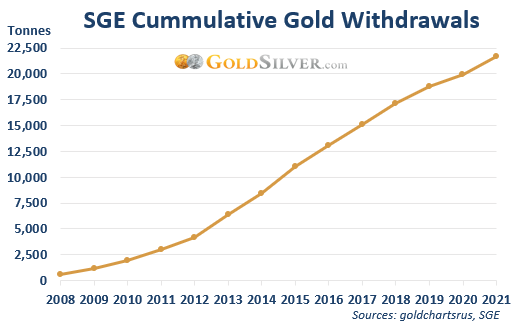Search the Community
Showing results for tags 'article'.
-
The topic of de-dollarization has taken on new life, a result of major geopolitical conflicts around the world. And the ultimate act of de-dollarization would be a non-US country initiating a gold standard. Russia grabs a lot of headlines right now, but the leading candidate for realistically instituting a gold standard is China. Would China really do that? And do they have enough gold Reserves anyway? The USA (and West) hold immense control over global trade, and one advantage of that is its ability to fund a massive military using the dollar. China wants to exert more power in the world and has global ambitions of its own, and to achieve them it needs to dethrone the dollar. It has been taking a number of steps recently to do just that—and you may be surprised to learn that gold is playing a role in it. How much of a role and what could it do to the gold price? To answer those questions we first have to talk about China’s motivations to leave the dollar system… De-Dollarization, Afterburners On Why would China, or any country for that matter, want to stop using US dollars in their trade? There are admittedly some advantages to settling trade in greenbacks, for both US and non-US countries. There’s one big reason China and other countries are motivated to move away from US-dominated trade: the US government sometimes uses the dollar as a weapon to impose sanctions. The obvious example is the sanctions the US just imposed on Russia, by freezing its foreign currency reserves. And last week they just blocked financial transactions involving its gold reserves. These kinds of moves are always an option since it holds the reserve currency of the world. And the foremost anti-sanction measure is to not use dollars. When Russia was removed from the SWIFT system, some analysts deduced that while it will hurt Russia’s economy in the short term, it could have the unintended consequence of accelerating the global trend of de-dollarization. The IMF managing director warned that Western sanctions on Russia “could backfire by making other foreign central banks more reluctant to hold such a large amount of their own foreign reserves in dollars and euros… we are likely to see some countries reconsidering how much of certain currencies they hold in their reserves.” And Washington think tank Institute for the Analysis of Global Security said that “central banks are starting to question whether reliance on the U.S. dollar is a good idea, since the United States has been extremely trigger-happy when it comes to the use of sanctions and other economic punishments.” The process has actually been underway for a few years now. For example, 90% of China and Russia’s bilateral trade settlements in 2015 were conducted in dollars—but by 2020, only 46% of those transactions were conducted in dollars. And in total global trade, dollars represented 70% in 2000 but just 59% in Q3-2021. Further, the move away from the dollar hasn’t been to the euro, sterling or yen; a full 25% of the shift has been into the Chinese renminbi. This is impressive considering it was only added to the IMF’s SDR basket in 2016. And more recently, Saudi Arabia dropped the petrodollar and is not selling oil in yuan, as Mike Maloney shows here. If this trend continues and fewer dollars are used internationally, it would have significant impacts: it would raise borrowing costs for the U.S. government, give them less leverage in foreign policy, and raise the cost of living for Americans. Think about it: the US government can print USDs at will and build up a massive military compared to China and other countries, giving them a distinct international advantage. While American citizens may take comfort in that, someone wanting to shift the power towards themselves would want to dethrone the USD for that very reason. The point here is that de-dollarization efforts increasingly open the door to a gold standard by a non-US country. China is motivated to accumulate gold. And based on numerous public reports and things they’ve actually done, it seems clear they’re at least thinking about a gold standard… Quoting a Beijing public policy research consultancy, the Chinese government newspaper Global Times reported, “What’s left is the gold standard. After the collapse of the Bretton Woods system, the questioning of the gold standard has never stopped. The gold standard essentially represents a world financial order. When an old financial order faces collapse, it is necessary to create a new financial order.” The governor of China’s central bank, Dr. Zhou Xiaochuan, wrote this in 2009: “The acceptance of credit-based national currencies as major international reserve currencies, as is the case in the current system, is a rare special case in history.” Very true; for the first time in recorded history, all currencies in the world are fiat (backed by nothing), and as Mike Maloney points out all fiat currencies eventually fail. China was on a silver standard about 100 years ago, so a metal standard is nothing new to them. China’s move to gold is still relatively young. The People’s Bank of China (their central bank) didn’t begin buying in big amounts until 2010, and the Shanghai Gold Exchange was only launched in 2002. China has a much more pro-gold mentality than the West. There are many examples of this, but I can provide a personal one… I was on a mining tour in China about a decade ago, which included meeting some government and mining officials, and when I asked them about gold, they dismissed and even laughed at the Western notions that it’s an outdated relic or a pet rock. They also seemed less concerned about the price, in the sense they’re not looking where it will be in the next three months but over the next three decades. This all may sound interesting and even compelling, but it raises one obvious question… Does China Have Enough Gold for a Gold Standard? When you drill down into the available data and look at everything happening with gold in China, you come to one inescapable conclusion: they have more than they’re reporting… First, Western journalists measure China’s gold appetite primarily via imports through Hong Kong. If Hong Kong imports are down, then China demand must be down. This is false. China has allowed direct gold imports into the country—other than through Hong Kong—for a number of years now. The “Hong Kong proxy” for Chinese demand is no longer accurate, and in fact can be very misleading. China imports gold directly into Beijing now, bypassing Hong Kong entirely. China allows a number of jewelers, dealers, and at least 14 state banks to directly import gold. Last April China expanded its program by giving domestic and international banks permission to import large amounts of gold. This includes agencies that buy gold directly for the PBoC—in London for example—which is not necessarily “declared.” None of these figures show up in Hong Kong numbers. Furthermore, China rarely releases trade data on gold, so not all of their data gets reported publicly and remains unknown. Why don’t they reveal it? It seems clear the government doesn’t want import figures tracked so that the rest of us don’t know how much they have. This move doesn't imply gold demand is down—just the opposite. Second, China normally uses dollars when trading in oil (as part of the petrodollar system), but now is also accepting yuan. The yuan is not well established internationally yet, so as an incentive the government offers its exporters the option to convert their yuan into gold. This essentially results in a new source of gold demand in the country, one also not tracked by official import data. Third, the Shanghai Gold Exchange is a real bullion market, in the sense that it trades primarily in physical metals (the Comex, in contrast, trades primarily in gold derivatives). It also allows immediate physical delivery on every contract. We can’t be certain, but “withdrawals” from the SGE could be a fair proxy for demand in the country. This chart shows the cumulative amount of withdrawals from the exchange since 2008. At the end of 2021, the total amount of physical gold withdrawals from the Shanghai Gold Exchange was 21,704 tonnes, roughly 690 million ounces. To put that into perspective, global gold production was approximately 113 million ounces last year. By the way, these withdrawals reduce the trading volume in North America. Why? Because China doesn’t sell and also does not export domestic mine production, which is significant since it’s the largest gold producer in the world. Something to keep in mind. Last, if they still don’t have enough for a gold standard, they could take the extreme step of confiscating it from their citizens. Remember, China is not a Democracy, and the banking system is not separate from the government. Gold confiscation and nationalization are nothing new in history—you can see many examples in our article on this topic. The bottom line is that China clearly has more gold than it reports, or at a minimum could get it. A New Standard for a Gold Standard Many countries store gold as part of their official monetary reserves. It’s a backstop, an insurance policy against a collapse of their currency or some economic calamity. Almost every report you'll see about gold reserves simply lists their total holdings. The US, for example, has 8,133 tonnes of gold in its Reserves, while China officially has just 1,948 tonnes. On the surface, it looks like the US is in a stronger position to go on a gold standard—but this view is misleading. That’s because of their total reserves, the US has minimal foreign currency reserves, while China has $3.4 trillion. The denominators are vastly different, relative to their total Reserves. A more practical measure would be to compare a country’s gold reserves to its annual GDP. This would tell us how much gold would be available to support the economy in the event of a global currency crisis, or back part or all of their currency. The following table shows the six largest holders of gold Reserves, and how much it represents their GDP (Eurozone countries are combined into one and include the ECB). Notice how much gold China would need to reach a gold-to-GDP ratio of 2% (gold row). If the Chinese government has or acquires, 6,000 tonnes of gold, it would have the same amount relative to its GDP as the United States. This would put them on par with the top gold holders around the world. Either way, this is probably a more realistic gauge of how they might determine their reserve goals. And if they’re intent on a gold standard it might give them enough to impose at least a partial one. There would be other options, too. China could combine their currency with other countries to form a gold standard, which means they wouldn’t necessarily need to back their currency 100%. Or team up with the IMF, who originally planned to have SDRs convertible to gold. Will the Red Dragon Someday Be Made of Gold? It seems clear that with China’s long-standing interest in gold, and its ongoing attempts to remove themselves from the US dollar system, they will want more gold—probably a lot more—in their Reserves. Even some mainstream economists have publicly stated that China’s current level of gold holdings is too low, given the size of its economy and the growing significance of its currency. So, is China stockpiling that gold now? Is that where some of the untracked bullion is going? My answer to those questions is an unequivocal yes. I say that because that’s exactly what they did before. China announced a 75.6% increase in their gold Reserves out of the blue in 2009—did they suddenly just buy all that, or is it more likely they’d been accumulating all along and then decided they wanted to make the announcement? Given the level of secrecy in many areas of their society, the latter is almost certainly the case. • It seems almost certain that China has more gold reserves than reported or at least access to them. And with de-dollarization efforts picking up steam they could be stepping up their pace. We don’t know exactly what China’s plans maybe, but it would not be surprising in the least if they’re preparing now to pounce at the next crisis, particularly a monetary one. Even if that doesn’t include a gold standard it would undoubtedly be a fireworks-type event for the gold price. For us investors, it is certainly not necessary for China to launch a gold standard. And it may not happen. But if a monetary crisis gets bad enough, a brave new world that includes a gold standard could become a growing possibility.
-
Just as a trader or investor buys stocks in a company, the foreign exchange market (or FOREX for short) allows you to buy and sell currencies, like owning a piece of the future rise or decline of an entire country's economy. In the following Forex Trading Course, you will learn how to make money by trading currencies. The course has four parts and gradually explains the fundamentals (what is FOREX, what influences the markets, currency pairs), how to read a forex chart, trends, and trendlines, how to use forex indicators, and how to choose the best forex broker for you. Forex Trading Course for Beginners - Fundamentals [Part 1/4] Forex Trading Course for Beginners - Charts & Trends [Part 2/4] Forex Trading Course for Beginners - Indicators & Strategies [Part 3/4] Forex Trading Course for Beginners - Trading Systems & Brokers [Part 4/4] Start reading the Forex Guide now! If you have questions or need help, post in our Forex forum, and we will gladly help you.
-
It is imperative for investors to find the best trading brokers to handle their transactions. In this article, I will review the firms that have recruited these talented people and how they can help you with trading securities. We will also detail each firm’s commission costs per trade, minimum balance requirements and what type of investors they fit best. The following trading brokers have proven to be the best by bringing their customers’ investments to fruition. 10. Motif Investing Motif Investing is a brokerage firm that is best suited for advanced traders, stock traders, and traders who plan on investing in motifs (30-stock or ETF baskets). The firm offers its investors flat-rate commissions of $4.95 for stocks and ETFs. Moreover, it has an account minimum requirement of $0 for trading accounts and a $1,000 minimum for their Motif Impact accounts. 9. Interactive Brokers This is yet another great brokerage firm that guarantees investors very low commission costs. The firm is ideal because of its high-quality trading platform and international trading capabilities. However, it demands a high minimum investment and charges an inactivity fee. As such, it may not be suitable for infrequent investors and beginners. Interactive Brokers charge a commission with fixed-rate and volume-tiered pricing starting at $1, has an account minimum of $10,000, and its promotion has special terms for customers aged 25 and below. Read the complete article here: https://ten.info/best-trading-brokers/
-
article 21 Businesses That Will Thrive in the 2022 Recession
DTheMan posted a topic in 🍹 General Chat
In this article, we list 21 Businesses That Thrive in Recession and prove why these businesses are recession-proof. In times of the low economy, being in business will worry you with your profits and sales, but being employed by someone would equally concern you in terms of job security and remunerations. KEY TAKEAWAYS Not all businesses and industries feel the same pain during an economic recession. Some businesses benefit as consumers cut back on substitute products and other competing options. Many businesses that do well during recessions either provide goods and services that increase demand directly due to recession conditions, offer cheaper alternatives to luxuries or big-ticket purchases, or for which the market is relatively inflexible to income changes. Most of the recession-proof businesses are in the following areas: Digital Industry, Health and Wellness, Food and beverages, Finances, Entertainment and..sins 🙂 https://monetize.info/businesses-that-thrive-in-recession/ -
Renaissance Technologies’ flagship Medallion fund returned over 66% per year from 1988 to 2018. That means $1 invested would have grown to over $20,000 while $1 invested in the S&P 500 would be worth $20. In fact, in 2008 when the S&P 500 lost 37%, the Medallion Fund gained 82%! Unlike traditional funds, Renaissance is run by hundreds of computer scientists, mathematicians, and neural engineers that specialize in “quantitative trading.” So how can you invest in the Medallion Fund? You can’t: it’s been closed to outside investors since 1993. Besides, access to quantitative funds requires an 8 figure check. Until now… Composer lets you invest in or build your own quant fund. Explore their pre-vetted quant strategies like “Risk On or Risk Off Leveraged S&P 500'' or “Buy the Dips Nasdaq.” Or, use their no-code portfolio editor to seamlessly drag and drop algo-strategies from scratch - replacing Python, Excel, and a few dozen PHDs. The best part? It’s completely free to use. Explore Composer Today.*
-
These days, the Federal Reserve is walking a knife's edge. High inflation is forcing its hand, and to tame it, the Fed has returned to Quantitative Tightening, hiking rates by 0.25% and promising 6-7 more hikes within this year. But if the Fed hikes too much too fast, it risks driving the economy -- which has been slowing dramatically recently -- into recession. A painful recession or persisting inflation. The Fed may very likely be forced to permit one in order to contain the other. If indeed faced with that choice, which one will Jerome Powell pick? For an answer to this vital yet very tricky question, we're lucky to be joined by Jim Bianco of macro research firm Bianco Research.







.png.1bf5f136afebe5f56e6e282be40a10c7.png)







